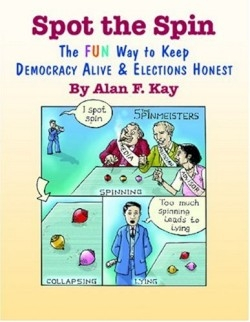
Spot the Spin
Public interest pollster Alan F. Kay is irritated with the money-compromised integrity of commercial polling organizations. Gallup Roper Zogby and similar outfits have to please their customers. The commercial pollster’s client is an individual a corporation or a party whereas the public interest pollster has a duty to the entire citizenry. Kay’s own foundation Americans Talk Issues (ATI) differs from the for-hire outfits in business practices survey design and operational rigor. The revenues aren’t remotely equivalent either—the sad truism that ethical behavior pays poorly isn’t one the author easily accepts.
Today PRNewswire press releases run verbatim in print media outlets and television news without an alert to trusting audiences that the copy was written by the report’s subject or a partisan pen. Tracking opinion isn’t enough anymore; now opinion is molded using data gleaned from countless privately commissioned polls and focus groups the public rarely hears about. No matter how few leaders’ proposals benefit the citizenry there is still an obligation to frame positions with respectful rhetoric. Kay warns aspirants that “Disparaging the public publicly is the kiss of death for a public personality.”
Spin is a many-headed hydra a broad bundle of distortionary practices that political strategists from across the spectrum use to shade the perception of events ultimately subverting the will of the population. Forms of spin include but aren’t limited to: key omission failure to disclose expert panelists’ vested biases and the highly effective limiting of policy choices to a narrower range than the actual opinions the public holds. “Most issues have more than two sides” Kay says but options are discarded and disparate choices are collapsed together at both the design and interviewing stages of a poll. For example Do you favor or oppose policy X? When citizens are told they may choose only public policy X or not X; Y and Z partisans are shunted into false choices or they disappear into a catchall dumpster labeled “Don’t Know” a bin seldom mentioned in newscasts. The slack gained by manipulating the size of the category enables commercial pollsters to skew results.
The author first coined the phrase “Fair and Balanced” before Rupert Murdoch re-minted it. Kay’s polling company ATI was founded in 1987. Its creation followed Kay’s career building the e-commerce pioneer AutEx and his work as an investing advisor to companies developing nonpolluting technologies. His previous book is called Locating Consensus for Democracy. Kay’s former business associate at ATI Fred Steeper served as campaign pollster for both Presidents Bush.
This informative book of considerable wit provides a service by revealing the smoke mirrors ventriloquism and sleight of hand spinmeisters use to keep illusions alive. Kay is generous with his accumulated experience and he seems smarter than most of us; nevertheless Spot the Spin was written prior to the 2004 elections and it isn’t up to date by the standards of an industry which is ideally based on accurate tracking of the public pulse.
Reviewed by
Todd Mercer
Disclosure: This article is not an endorsement, but a review. The publisher of this book provided free copies of the book and paid a small fee to have their book reviewed by a professional reviewer. Foreword Reviews and Clarion Reviews make no guarantee that the publisher will receive a positive review. Foreword Magazine, Inc. is disclosing this in accordance with the Federal Trade Commission’s 16 CFR, Part 255.
